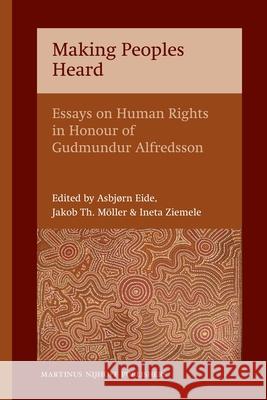Making Peoples Heard: Essays on Human Rights in Honour of Gudmundur Alfredsson » książka
Making Peoples Heard: Essays on Human Rights in Honour of Gudmundur Alfredsson
ISBN-13: 9789004191914 / Angielski / Twarda / 2011 / 676 str.
A leading theme in this impressive collection of essays in honour of Professor Gudmundur Alfredsson is the advancement of international rules and mechanisms to empower individuals, groups and peoples everywhere to pursue their rights nationally, regionally and internationally. The book deals with the many areas of international law and national policies and practices in which important progress has been made since the adoption of the Universal Declaration of Human Rights for better protection of human rights in the modern world. It equally provides a critical discussion of the difficulties and failures in various areas and probes questions and issues that are pending solution at the national, regional or universal levels. The book begins with the examination by several authors from their different perspectives (general international law, international human rights law and humanitarian law) of the existence and meaning of the right to peace. Subsequent chapters examine in detail the standard setting, monitoring and other ways of ensuring compliance by States and international organizations with the applicable human rights rules. A special chapter is devoted to the rights of indigenous peoples and minorities, an issue of particular interest and concern to Gudmundur Alfredsson. The contributors are academics or practitioners in the field of international law and human rights, nearly all of whom having in their own work been closely associated with Professor Alfredsson's various projects aimed at the promotion and protection of human rights. "This is a remarkable book, written by insiders for one of the most prominent players in the international human rights system, particularly at the UN level. It can serve as a genuine commentary on many of the most burning issues within that system, ranging from the performance of the UN Human Rights Council and the situation of "UNmikistan" (Kosovo) to the latest developments of the law on minorities and indigenous peoples, both at the global and regional level." H.E. Judge Bruno Simma, International Court of Justice.











